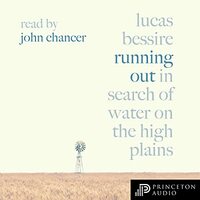Take a photo of a barcode or cover
Too slow paced. Having personal connections to the story as part of a narrative is fine, but this got super bogged down in personal relationship and I could not push through.
This book is the right one at the right time. Bessire is an anthropologist who is focused on understanding how the residents of Southwestern Kansas are dealing with the fact that the groundwater in the Oglala Aquifer is running out - the groundwater which has made industrial agriculture possible in that semi-arid land. Bessire is in his 40's and he grew up on a farm inherited from his grandfather that has pumped immeasurable gallons of that groundwater and continues today. Bessire was able to conduct his research - ethnographic fieldwork - because his dad, a local irrigation farmer, setup a lot of the conversations. I found Bessire's book so compelling as he does a great job of demonstrating how people live in semi-denial when confronting a snowballing tragedy and because he does so while also confronting his own responsibility. He may not be responsible for the past but he is for the future. Passages, especially in the intro and the afterword can be too abstract and hard to follow, but the stories he tells of his dad and him interviewing people and attending governmental meetings are insightful and, at times, kinda funny and sweet.
And then there is his recognition how very similar blighted regions exist across the globe and how colonialism and big corporate agriculture seem to play similar roles in place after place.
And then there is his recognition how very similar blighted regions exist across the globe and how colonialism and big corporate agriculture seem to play similar roles in place after place.
medium-paced
challenging
dark
informative
reflective
fast-paced
dark
hopeful
informative
reflective
sad
tense
medium-paced
This is one of the best academic books I have read in some time. A sublime combination of ethnographic sensibility and literary skill. I not only learned about an urgent and timely topic but was deeply touched by the writing and the author's experiences.
"Call it out for what it is, they told me, and let the chips fall where they may."
"Call it out for what it is, they told me, and let the chips fall where they may."
A blend of poetic writing, firsthand experience, and the latest science. Lots of highlights from this one.
Merged review:
A blend of poetic writing, firsthand experience, and the latest science. Lots of highlights from this one.
Merged review:
A blend of poetic writing, firsthand experience, and the latest science. Lots of highlights from this one.
emotional
informative
reflective
slow-paced
Anyone who cares about climate change and local politics, water, farming, and the state of the planet should read this book. I picked this up after driving across Kansas twice this summer; I was hoping to learn more about a way of life this is pretty foreign to me, but one that I had glimpsed from the highway driving 70 miles an hour: feedlots, rolling grass hills, pronghorn, irrigation. Bessire’s beautiful and personal story of a farming generation confronting (and avoiding) the depletion of the Oglala aquifer describes a whole world of people like you and me faced with the end of a way of life. In applying his anthropologist’s training to the place he grew up, he clarifies the issues, suggests some solutions, and concludes that we are all complicit in the depredations that began with Native American and bison genocide and may end with desertification of the Plains. But being complicit also means we can be part of the solution. His descriptions of southwest Kansas reveal a beauty that might not be obvious to most of us, but it is one that compels deep love for the place. I wish this book had never ended and I hope it wins awards.







